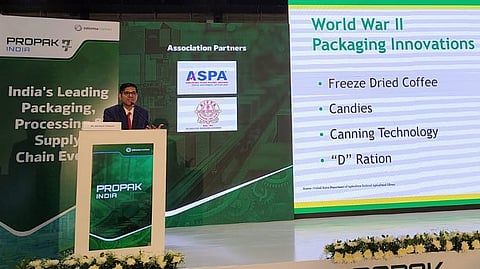
- Home
- EventsEvents
- Product Launches
- CategoriesCategories
- Advertise
- Opinion

In today’s fast-changing market, packaging has evolved far beyond its traditional role of protecting a product. It has become a key factor in influencing what people buy—especially Millennials and Generation Z.
At the ProPak India 7th Edition, food technologist and founder of Binder Technology Consultancy, Bhushan Namdeorao Yengade, delivered an insightful address titled "The Role of Packaging Innovations in Shaping Millennial and Gen Z Consumer Choices". Drawing from extensive industry experience and market research, Yengade explained how modern packaging strategies are guiding younger consumers’ purchasing decisions more than ever before.
Yengade is the founder of Binder Technology Consultancy, a firm offering support in food processing technical project management, training, and market research. His consultancy has worked with multiple sectors of food processing, and even petrochemicals.
He began his session by underlining the power of Millennial (born between 1981 and 1996) and Gen Z (born between 1997 and 2012) consumers in the global marketplace. “These generations are not just buying products—they’re buying values. They expect packaging to reflect what a brand stands for, especially when it comes to sustainability and transparency,” said Yengade.
Referring to insights from the Food and Agriculture Organization (FAO, 2018), he added that packaging must do more than maintain product integrity. It must also reduce waste and contribute to the environmental goals of modern food systems.
“Packaging today is not just a cover—it communicates a message,” Yengade explained. “It tells consumers what a brand believes in, even before the product is opened.”
Findings from Binder Technology Consultancy’s research also show that while sustainability remains important, convenience is another top priority. Packaging features such as resealable pouches, easy-to-open lids, and portion-controlled options are proving popular with younger, urban consumers.
“Gen Z wants more than functionality—they want personalisation,” he added. “They appreciate packaging that feels like it was designed with them in mind, whether through unique visuals, custom messages, or user-friendly design. Packaging today must be a combination of science, storytelling, and style.”
Yengade also discussed the rapid growth of smart packaging. This includes the use of QR codes, augmented reality, and traceable features that let consumers learn more about product origins, safety, or engage with the brand digitally.
He gave a familiar example to the Indian audience: curd, or dahi. “Who would’ve thought that dahi would become a supermarket item with flavours and premium packaging? But that’s exactly what Gen Z expects—mango or blueberry flavoured curd in a branded, resealable container.”
He went on to say that products like mishti doi and chhaas are now being marketed with regional identity and innovative packaging. He highlighted how some brands are even using earthen pot-style containers for ice cream, merging traditional Indian aesthetics with modern food branding.
“This is a great example of cultural sensitivity in design—where local tradition meets modern packaging,” said Yengade.
However, he also addressed the real challenges facing the packaging industry, especially in India. He cited a recent Binder Technology Consultancy study conducted in the Godavari region of Andhra Pradesh, focusing on the availability and pricing of packaging raw materials like sugarcane bagasse, maize, and rice husk.
“Raw material management is imperative to understanding price fluctuations,” he explained. “Maize prices are largely influenced by the international market, while rice husk and bagasse prices are more stable because of India’s strong domestic supply. Still, seasonality creates instability in packaging costs.”
These variations can make it hard for packaging manufacturers to maintain consistent pricing and meet sustainability targets. “Sustainability should not be just a buzzword,” Yengade warned. “It needs real support through infrastructure and policy. We need government subsidies and financial incentives to encourage the shift toward greener packaging materials.”
He also raised a key question: “Everyone says they want eco-friendly products, but are we, as consumers, truly ready to make that change? Sustainability is not just the responsibility of manufacturers—it’s a shared duty for us all.”
Looking ahead, Yengade said emerging technologies will play a major role in driving innovation.
“Artificial intelligence and machine learning can improve how packaging is designed and produced,” he said. “But beyond that, the future lies in packaging that disappears—biodegradable, even edible solutions that leave no trace.”
Yengade also referred to a recent seminar organised by the AFST Mumbai Chapter. He highlighted a standout keynote delivered by Professor Keshavan Niranjan from the University of Reading, UK, who is widely recognised for his pioneering work on sustainable food processing and packaging. He echoed the same sentiment on sustainability.
“Packaging is no longer just protection—it’s persuasion. It reflects your brand, connects emotionally with the consumer, and often determines whether a product gets chosen or ignored. In a world led by Millennials and Gen Z, packaging must adapt—and do so responsibly.”
As the demand for sustainable and personalised packaging continues to rise, food brands, retailers, and technologists will need to innovate faster and more meaningfully. The future of packaging is not just about preserving products—it’s about protecting the planet too.
Click HERE to subscribe to our FREE Weekly Newsletter
